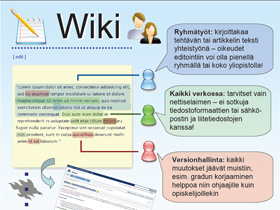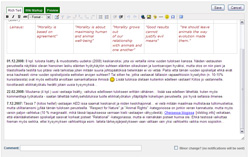Go to:
»» University of Helsinki Wiki
»» Opetusteknologiakeskus: Wiki-palvelun sivut

Introduction
A wiki is basically a web page that can be edited by many people. The underlying concept is simple: you view a page someone has made, click on the “edit” button to make changes to the page and finally click “save” to save these changes. This concept works great for encyclopedias like Wikipedia [wikipedia.org], or documentation [OpenOffice.org as an example]. Or simply to build a web page.
What (technically) makes a wiki a wiki is the layer of user account and version history management built on top of the web page editing system.  The University of Helsinki has its own wiki service that utilizes Atlassian’s Confluence wiki-software. It has a lot of bells and whistles but the backside of that is a slightly increased learning curve. An introductory course is recommended for non-geeky teachers. The wiki can basically be used for anything, but is especially powerful for collaborative work where you edit text using the wiki-editor. Wikis are by nature open, so setting up closed courses for annually changing groups of teachers and students isn’t as intuitive as when using a learning environment because of how the user management works. The University of Helsinki´s upcoming Moodle 1.9 can however integrate wikipages made with Confluence (and create wikis inside Moodle, automatically adding the necessary users from Moodle), which might help in bringing the best of both worlds to the table.
The University of Helsinki has its own wiki service that utilizes Atlassian’s Confluence wiki-software. It has a lot of bells and whistles but the backside of that is a slightly increased learning curve. An introductory course is recommended for non-geeky teachers. The wiki can basically be used for anything, but is especially powerful for collaborative work where you edit text using the wiki-editor. Wikis are by nature open, so setting up closed courses for annually changing groups of teachers and students isn’t as intuitive as when using a learning environment because of how the user management works. The University of Helsinki´s upcoming Moodle 1.9 can however integrate wikipages made with Confluence (and create wikis inside Moodle, automatically adding the necessary users from Moodle), which might help in bringing the best of both worlds to the table.
Advantages:
+ good for writing collaborative documents (assignments for students or perhaps even research papers – at least for commenting a near-finalized version)
+ version control containing the whole editing history; works as a backup, can also be used for eg. determining student activity
+ good commenting option (for blog-style commenting of documents)
+ possible to invite persons without a university user account into a closed wiki area (research groups, international networks – example:
Disadvantages:
– having many features makes it a bit messy looking for novices
– requires quite a bit of effort to learn all the quirks of the system and setup more advanced pages
– no easy management of groups (= inviting a whole class of students to a closed area requires more effort than Moodle or BSCW)
Cases at the Faculty of Veterinary Medicine:
»» Nordic Network of Agriculture and Food Ethics (includes an internal file area for members and news to www-page (linked) using wiki RSS-feed)
»» Etiikkajuonne (ethics course page with news and links editable by anyone)
»» TVT-ajokortti / ICT-driving licence (used simply as a homepage)
References:
Wikis, blogs and podcasts: a new generation of Web-based tools for virtual collaborative clinical practice and education, BMC Medical Education 2006, 6:41 [http://www.biomedcentral.com/1472-6920/6/41/]
